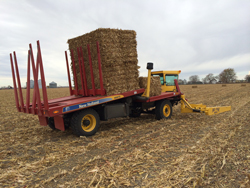 A company that turns locally available feedstocks into biofuels, as well as fertilizer, animal feed and filtered water, is being recognized for its green efforts. Greenbelt Resources picked up the “Best Biofuels and Biochemicals Solution” in The New Economy magazine’s annual 2014 Clean Tech Awards.
A company that turns locally available feedstocks into biofuels, as well as fertilizer, animal feed and filtered water, is being recognized for its green efforts. Greenbelt Resources picked up the “Best Biofuels and Biochemicals Solution” in The New Economy magazine’s annual 2014 Clean Tech Awards.
Greenbelt Resources’ small scale systems, can be more energy efficient than traditional large-scale plants due to its patent-pending energy saving membrane-based dehydration module. Where deployed, these systems reduce waste outflow, reduce transport of the F’s, minimize environmental impact, produce overall cost savings and foster local job retention.
“Our unique modular local-scale technology turns industry assumptions upside-down and proves the practicality of cost-effective local resource utilization,” says Floyd Butterfield, chief technology officer of Greenbelt Resources. “Recognition by The New Economy proves that global business leaders share our vision of a distributed energy source future.”
“We envision future off-grid installations to be capable of converting locally grown crops into fuel for both transportation and home appliances, fertilizer, animal feed, distilled water, heat, electricity, and connectivity,” emphasizes Darren Eng, CEO of Greenbelt Resources. “For example, a community in Africa could utilize the system to convert local feedstock into fuel for vehicles and heating stoves, distribute excess electricity to a local grid providing children light at night for their studies, and provide families with clean drinking water.”
The award will be presented at the London Stock Exchange in March of 2015.










